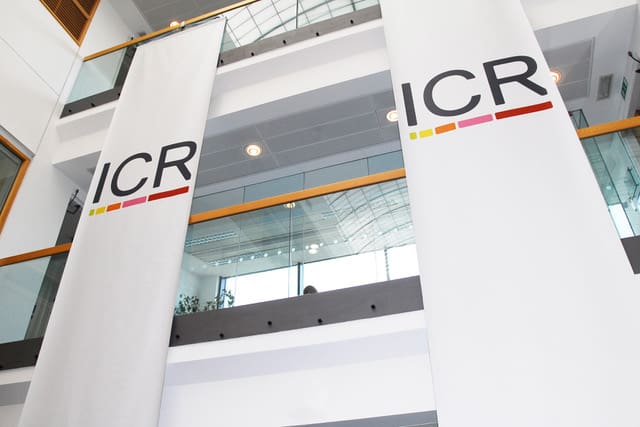预约演示
更新于:2024-11-01
The Institute of Cancer Research
私营公司|United Kingdom
私营公司|United Kingdom
更新于:2024-11-01
概览
标签
肿瘤
血液及淋巴系统疾病
消化系统疾病
小分子化药
蛋白水解靶向嵌合体(PROTAC)
溶瘤病毒
疾病领域得分
一眼洞穿机构专注的疾病领域
暂无数据
技术平台
公司药物应用最多的技术
暂无数据
靶点
公司最常开发的靶点
暂无数据
| 排名前五的药物类型 | 数量 |
|---|---|
| 小分子化药 | 8 |
| 蛋白水解靶向嵌合体(PROTAC) | 2 |
| 溶瘤病毒 | 1 |
| 化学药 | 1 |
| 排名前五的靶点 | 数量 |
|---|---|
| TTK(TTK蛋白激酶) | 2 |
| HSF1 | 1 |
| BRD9(溴结构域蛋白-9) | 1 |
| BCL6(原癌基因蛋白质c-bcl-6) | 1 |
| EIF2AK4 | 1 |
关联
14
项与 The Institute of Cancer Research 相关的药物靶点 |
作用机制 PKR抑制剂 [+2] |
最高研发阶段临床2期 |
首次获批国家/地区- |
首次获批日期- |
靶点 |
作用机制 EIF2AK4刺激剂 |
非在研适应症- |
最高研发阶段临床1期 |
首次获批国家/地区- |
首次获批日期- |
靶点 |
作用机制 HIF-PHs抑制剂 |
在研适应症 |
非在研适应症- |
最高研发阶段临床前 |
首次获批国家/地区- |
首次获批日期- |
100 项与 The Institute of Cancer Research 相关的临床结果
登录后查看更多信息
0 项与 The Institute of Cancer Research 相关的专利(医药)
登录后查看更多信息
1,518
项与 The Institute of Cancer Research 相关的文献(医药)2024-12-31·International Journal of Hyperthermia
Histological characterization of HIFU lesions
Article
作者: ter Haar, Gail ; Mouratidis, Petros ; Jayadewa, Chaturika ; Rivens, Ian
2024-12-01·Translational Oncology
Characterisation of cells markers associated with IKZF1plus in BCP-ALL
Article
作者: Lopes, Bruno A ; Maciel, Ana Luiza Tardem ; Figueiredo, Ariadne da Rocha ; Blunck, Caroline Barbieri ; Poubel, Caroline Pires ; Schramm, Márcia Trindade ; da Costa, Elaine Sobral ; Barbosa, Thayana C ; Land, Marcelo G.P. ; Land, Marcelo G P ; Lopes, Bruno A. ; Lins, Mecneide Mendes ; Barbosa, Thayana C. ; Gomes, Renan Garcia ; Mansur, Marcela Braga ; Aguiar, Thais Ferraz ; Ikoma-Coltutato, Maura Rosane Valério ; Emerenciano, Mariana
2024-12-01·Clinical Genitourinary Cancer
Comparison of Industry-Sponsored Trials (IST) and Investigator-Initiated Trials (IIT) in Advanced Genitourinary Cancers in the United States, Canada, United Kingdom and France
Article
作者: Peng, Jenny ; Sridhar, Srikala S. ; Wong, Bryan ; James, Nick ; Powles, Thomas ; Jiang, Di Maria ; Fizazi, Karim ; Sridhar, Srikala S
12
项与 The Institute of Cancer Research 相关的新闻(医药)2024-10-08
Researchers from the Institute of Cancer Research (ICR) have highlighted the potential benefits of treating bladder cancer with personalised radiotherapy.
More than 130,000 patients are treated on the NHS every year with radiotherapy, which works by targeting tumours with X-ray radiation. However, the current use of the treatment usually involves a ‘one size fits all’ approach, in which the dosage is the same in each session.
Published in the journal
European Urology
, the phase 2 RAIDER study was designed to find out whether muscle-invasive bladder cancer can be treated with adaptive radiotherapy, a method that involves changing the volume of radiotherapy depending on the area of the body being targeted.
The researchers split 345 patients into one of three groups. Patients in the first group received the same treatment plan in each session, while those in the other two were given one of a number of treatment plans, determined on a case-by-case basis in each session.
The researchers found that there were fewer serious long-term side effects six to 18 months after treatment than those reported in previous studies across all three groups, with no evidence that those who received higher dose treatment had any worse side effects compared with those who received standard radiotherapy treatment.
Approximately 10,500 new cases of bladder cancer are diagnosed in the UK every year. Healthcare workers face a number of challenges treating the disease and the changing shape and position of the bladder can create complications when delivering targeted radiotherapy.
The work was funded by Cancer Research UK, Cancer Australia and the Cancer Society of New Zealand, and also supported by the National Institute of Health and Care Research Biomedical Research Centre at The Royal Marsden NHS Foundation Trust.
Robert Huddart, professor of urological cancer and honorary consultant clinical oncologist at the Royal Marsden and group leader at the ICR said: “Delivering radiotherapy to the bladder is a challenging process. We are pleased this work into a potential new way of treating bladder cancers has allowed us to deliver effective treatment safely and allowed us to use a high dose which promises to cure more patients, with relatively few long-term side effects.
“We look forward to studying this method further to explore its effectiveness versus current treatment options.”

放射疗法临床2期临床结果
2024-08-30
A team of researchers has found that a drug currently used to treat breast cancer could help slow the growth of the rare childhood brain tumour diffuse hemispheric glioma (DHG).
Published in the journal
Cancer Cell
, the research from the Institute of Cancer Research (ICR) and the Dana-Farber Cancer Institute showed that ribociclib could be a potential new drug to target the disease.
DHGs are high-grade tumours that typically have a prognosis of 18 to 22 months.
The researchers, partly funded by the Brain Tumour Charity and Cancer Research UK, focused on a type of DHG with a specific DNA mutation, known as H3G34-mutant.
They discovered that tumour cells disrupt the normal development of neurons and found that targeting the CDK6 protein, which is involved in regulating cell division, could make these cells vulnerable to treatments.
Novartis’ ribociclib, a CDK4/6 inhibitor currently sold under the brand name Kisqali, was then used to treat a child with a brain tumour when other treatments had failed.
The drug resulted in stable disease for a further 17 months before the tumour started to grow back, which the researchers have described as “remarkable” given that the disease usually progresses within 3.5 months following recurrence.
The child is currently undergoing further treatment, more than four years since their initial diagnosis.
Chris Jones, professor of childhood brain tumour biology at the ICR, said: “This work shows the importance of understanding how brain tumours develop in order to figure out better ways to treat these patients.
“It was a surprise to realise that this type of glioma seemed to arise from developing neurons, but we were able to use this knowledge to find specific vulnerabilities in these cancer cells, which hopefully we can now translate into clinical trials.”
The team has outlined that, while ribociclib is not a cure for the disease, the findings are significant and could pave the way for future drug combinations to be explored in clinical trials.
Mariella Filbin, co-director of the paediatric neuro-oncology programme at the Dana-Farber Cancer Institute, said: “This is the first time we found functional consequences of aberrant lineage specification in tumour cells – a result that was unexpected at first, but is now setting the stage for new therapeutic avenues in this disease.”

2024-08-16
A study led by the Institute of Cancer Research (ICR), the University of Oxford and the University of Manchester has revealed previously unknown genetic causes of colorectal cancer (CRC).
Published in
Nature
, the new research offers an unprecedented view of the genetic landscape of CRC and its response to treatment.
CRC is the third most commonly diagnosed cancer globally, with more than 44,000 new cases of the disease diagnosed in the UK every year.
Researchers analysed 2,023 bowel cancers from the 100,000 Genomes Project led by Genomics England and NHS England to identify new gene faults that lead to CRC and uncovered new CRC cancer sub-groups with specific genetic characteristics that affect how cancer behaves and responds to treatment.
In total, the team identified over 250 key genes that play a crucial role in CRC, as well as four novel common sub-groups based on genetic features, along with several rare CRC sub-groups, which have different patient outcomes and may respond differently to therapy.
In addition, the team identified a variety of genetic mutation causes across different regions of the colorectum, highlighting differences in CRC causes between individuals, which could potentially be targeted with existing treatments currently used across other cancers.
Commenting on the findings, co-lead researcher and ICR’s professor of cancer genomics, Richard Houlston, said: “This research is a great insight into the biology of CRC, uncovering the clues as to how it develops, grows and responds to treatments… Future studies [can] use these findings to develop tailored treatments for people with CRC based on their genetics.”
Dr Henry Wood, lecturer in translational bioinformatics from pathology, University of Leeds’ School of Medicine, added: “We are now in a position to investigate the importance of the microbiome in the development of these cancers and whether we can change it to influence the tumour and improve patient outcomes.”
Earlier this year, in June, Bristol Myers Squibb’s KRAS inhibitor Krazati (adagrasib) received accelerated approval from the US Food and Drug Administration alongside cetuximab as a targeted treatment option for adults with locally advanced or metastatic cases of CRC who are carrying the KRASG12C mutation.

加速审批基因疗法临床研究
100 项与 The Institute of Cancer Research 相关的药物交易
登录后查看更多信息
100 项与 The Institute of Cancer Research 相关的转化医学
登录后查看更多信息
组织架构
使用我们的机构树数据加速您的研究。
登录
或

管线布局
2025年07月01日管线快照
管线布局中药物为当前组织机构及其子机构作为药物机构进行统计,早期临床1期并入临床1期,临床1/2期并入临床2期,临床2/3期并入临床3期
药物发现
3
9
临床前
其他
2
登录后查看更多信息
当前项目
| 药物(靶点) | 适应症 | 全球最高研发状态 |
|---|---|---|
CCT-137690 ( AURK x FLT3 ) | 急性髓性白血病 更多 | 临床前 |
IOX5 ( HIF-PHs ) | 急性髓性白血病 更多 | 临床前 |
NXP-800 ( EIF2AK4 ) | 铂类耐药的 ARID1A 突变卵巢癌 更多 | 临床前 |
CCT374705 ( BCL6 ) | 淋巴瘤 更多 | 临床前 |
CCT251455 ( TTK ) | 肿瘤 更多 | 临床前 |
登录后查看更多信息
药物交易
使用我们的药物交易数据加速您的研究。
登录
或

转化医学
使用我们的转化医学数据加速您的研究。
登录
或

营收
使用 Synapse 探索超过 36 万个组织的财务状况。
登录
或

科研基金(NIH)
访问超过 200 万项资助和基金信息,以提升您的研究之旅。
登录
或

投资
深入了解从初创企业到成熟企业的最新公司投资动态。
登录
或

融资
发掘融资趋势以验证和推进您的投资机会。
登录
或

Eureka LS:
全新生物医药AI Agent 覆盖科研全链路,让突破性发现快人一步
立即开始免费试用!
智慧芽新药情报库是智慧芽专为生命科学人士构建的基于AI的创新药情报平台,助您全方位提升您的研发与决策效率。
立即开始数据试用!
智慧芽新药库数据也通过智慧芽数据服务平台,以API或者数据包形式对外开放,助您更加充分利用智慧芽新药情报信息。
生物序列数据库
生物药研发创新
免费使用
化学结构数据库
小分子化药研发创新
免费使用



